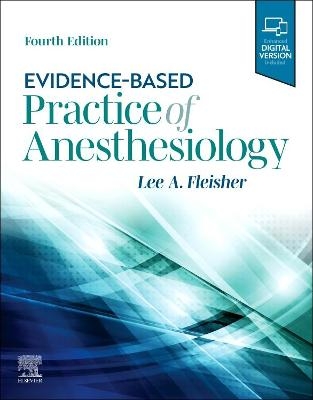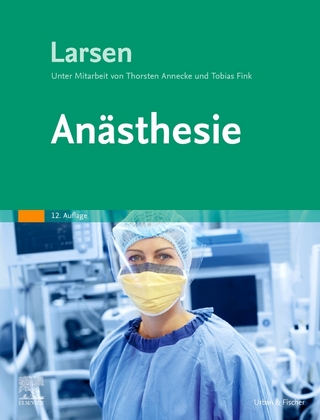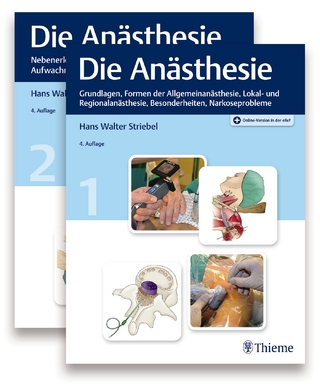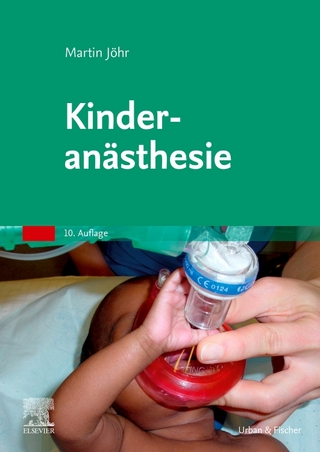
Evidence-Based Practice of Anesthesiology
Elsevier - Health Sciences Division (Verlag)
978-0-323-77846-6 (ISBN)
World-renowned authority, Dr. Lee A. Fleisher, takes an evidence-based approach to a variety of high-impact topics related to effective perioperative patient management: preoperative assessment; monitoring and administration of anesthesia during surgery; postoperative intensive care management; and postoperative pain management. The 4th Edition has been updated from cover to cover, helping you make informed clinical decisions based on reliable, up-to-date guidance in every aspect of patient care.
- Explores important issues in perioperative management, discussing the available options, examining the relevant research, and presenting practical recommendations.
- Features concise, to-the-point chapters with numerous quick-reference tables for fast and effective decision making.
- Includes decision trees throughout to provide visual guidance and a logical flow of key decision points.
- Contains nine new chapters on how to identify patients at risk for postoperative neurocognitive disorder; the best strategy for perioperative ACE and ARB agents; emergency laparotomy; optimal postoperative analgesia and the opiate naive patient; the best method for perioperative handoffs; myocardial injury after non-cardiac surgery (MINS); and more.
- Helps you master the current best practices you need to know for successful day-to-day practice and oral board review.
- Enhanced eBook version included with purchase. Your enhanced eBook allows you to access all of the text, figures, and references from the book on a variety of devices.
Lee A. Fleisher, Robert Dunning Dripps Professor and Chair of Anesthesiology and Critical Care Medicine, Professor of Medicine, Perelman School of Medicine at the University of Pennsylvania, Philadelphia, Pennsylvania
1 Evidence-Based Practice Parameters: The American Society of Anesthesiologists Approach
2 Is a Preoperative Screening Clinic Cost-Effective?
3 Which Patient Should Have a Preoperative cardiac Evaluation (Stress Test)?
4 Should Patients with Stable Coronary Artery Disease Undergo Prophylactic Revascularization Before Noncardiac Surgery?
5 Reducing Risk of Perioperative Stroke
6 How Should We Identify Patients At Risk For Postoperative Neurocognitive Disorder; Who and How Should We Screen for Cognitive Dysfunction Preoperatively?
7 Which Labs Are Necessary
7 Who and How Should We Screen For Cognitive Dysfunction Preoperatively
8 Is Routine Preoperative Pregnancy Testing Necessary?
9 Should Preoperative BNP Be Performed Routinely
10 How Should We Prepare the Patient with a Pacemaker/Implantable Cardioverter--Defibrillator?
11 What are the Proper Preparations for the Patient with Previous PCI?
12 Should All Antihypertensive Agents Be Continued Before Surgery?
13 Best Strategy for Perioperative ACE and ARB Agents
14 How Should Beta-Blockers Be Used Perioperatively?
15 Are Alpha-2 Agonists Effective in Reducing Perioperative Cardiac Complications in Noncardiac Surgery?
16 Does the Airway Examination Predict Difficult Airway Management?
17 DO Checklists Improve emergency Management
18 Is There an Optimal Timing for Smoking Cessation?
19 Is there a Best Approach for Patients with Difficult Airways: Regional Versus General Anesthesia?
20 Do Inhalational Agents Have Beneficial Effects on Cardiac Ischemia-Reperfusion Injury?
21 What Works to Reduce Surgical Infection?
21 Does Anesthetic Choice Affect Surgical and Recovery Times?
22 Aspiration: Is There an Optimal Management Stragegy?
23 Emergency Laparotomy
24 When Are Platelet/Plasma Transfusions Indicated?
25 What is the Role of Ketamine in Perioperative Management?
26 When Should Perioperative Glucocorticoid Replacement Be Administered?
27 Does the Choice of Fluid Matter in Major Surgery?
28 What are the Benefits of Different Ventilatory Techniques?
29 What is the Best Strategy for Prevent Postoperative Nausea and Vomiting?
30 Is There an Optimal Perioperative Hemoglobin?
31 Does Perioperative Hyperglycemia Increase Risk? Should We Have Aggressive Glucose Control Perioperatively?
32 What is the Best MEans of Preventing Perioperative Renal Injury?
33 Is Nitrous Oxide Associated with Outcome?
34 Should Targeted Temperature Management be used Routinely After Intraoperative Cardiac Arrest?
35 What Works in Achieving Fast-Track Surgery?
36 Can We Prevent Recall During Anesthesia?
37 Nonsteroidal Antiinflammatory Drugs, Antiplatelet Medications, and Spinal Axis Anesthesia
38 The Best Approaches to Prophylaxis Against DVT Formation When Using a Combination of Neuraxial Anesthesia and One of the Heparins
39 Is There a Best Analgesic Technique for Hip Surgery?
40 Should Regional Anesthesia be Used for Orthopedic Trauma Patients?
41 Is There a Best Technique to Decrease Blood Loss and Transfusion after Coronary Artery Bypass Grafting?
42 Is There a Best Technique in the Patient with Increased Intracranial Pressure?
43 What Works for Brain Protection?
44 Optimal Intraoperative Technique to Prevent Postoperative Delirium
45 What Actions Can Be Used To Prevent Peripheral Nerve Injury?
46 Which Are the Best Techniques for Reducing the Incidence of Postoperative Deep Vein Thrombosis?
47 Does Neurologic Electrophysiologic Monitoring Affect Outcome?
48 Anesthesia for Cesarean Delivery--Regional or General?
49 When Should a Combined Spinal-Epidural (CSE) Be Used?
50 What Is the Optimal Management of Post-Dural Puncture Headache?
50 Is Regional Superior to General Anesthesia for Infrainguinal Revascularization?
51 Does Anesthesia Increase the Risk to the Parturient Undergoing Nonobstetric Surgery?
52 Does Labor Analgesia Affect Labor Outcome?
53 When Should Regional Anesthesia be Used in Pediatric Patients?
54 How Young Is the Youngest Infant for Outpatient Surgery
55 What Works in a Patient with Acute Respiratory Distress Syndrome?
56 Are Patients with Sleep Apnea Appropriate for Ambulatory Surgery?
56 Discharge Criteria for Outpatient Surgery
57 What Drugs Decrease Postoperative Bleeding?
58 What Must I Consider to Safely Anesthetize Someone in the Office Setting?
59 Optimal Postoperative Analgesia--Opiate Exposed Patient
60 Optimal Postoperative Analgesia--Opiate Naive Patient
61 What Is The Best Method For Perioperative Handoffs
62 Is Troponitis Important?
67 How Can We Prevent Postoperative Cognitive Dysfunction?
67 What is the Best Method of Diagnosing Perioperative Myocardial Infarction?
67 What Criteria Should Be Used for Discharge After Outpatient Surgery?
67 Is There an Optimal Intraoperative Technique for Delayed Neurocognitive Recovery
| Erscheinungsdatum | 07.07.2022 |
|---|---|
| Verlagsort | Philadelphia |
| Sprache | englisch |
| Maße | 216 x 276 mm |
| Gewicht | 970 g |
| Einbandart | kartoniert |
| Themenwelt | Medizin / Pharmazie ► Medizinische Fachgebiete ► Anästhesie |
| ISBN-10 | 0-323-77846-1 / 0323778461 |
| ISBN-13 | 978-0-323-77846-6 / 9780323778466 |
| Zustand | Neuware |
| Informationen gemäß Produktsicherheitsverordnung (GPSR) | |
| Haben Sie eine Frage zum Produkt? |
aus dem Bereich


